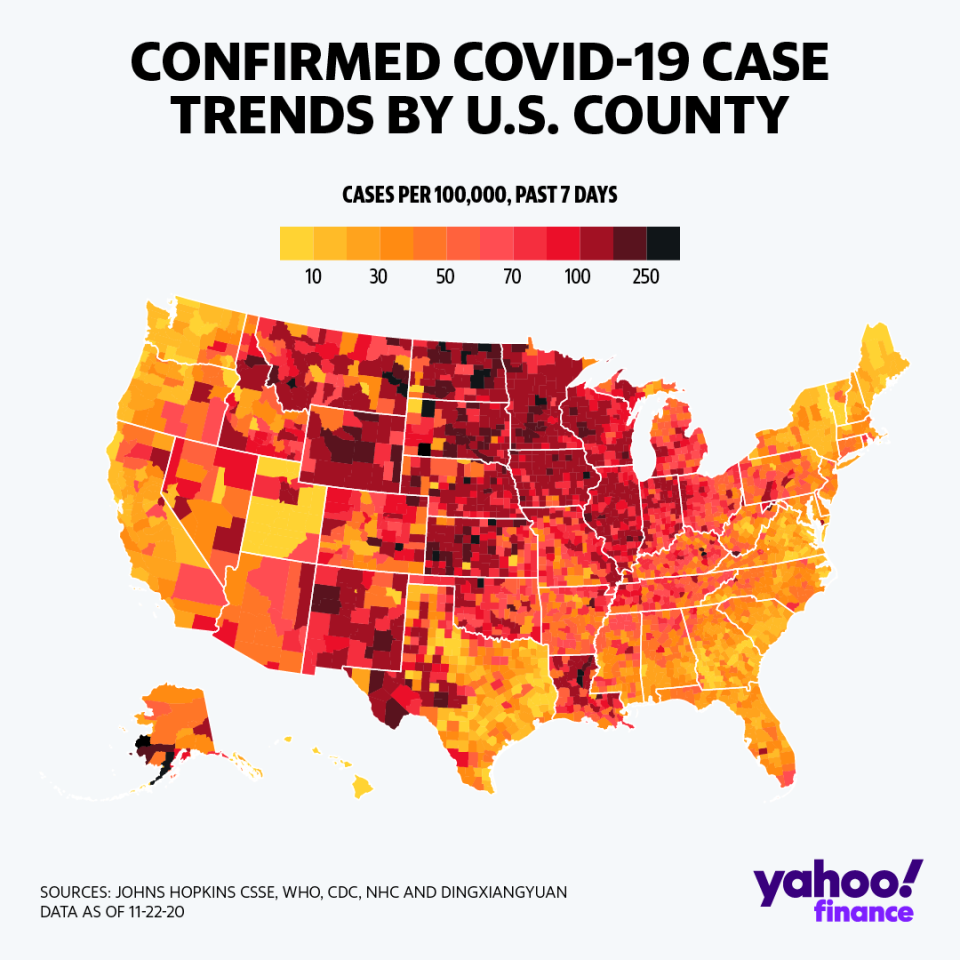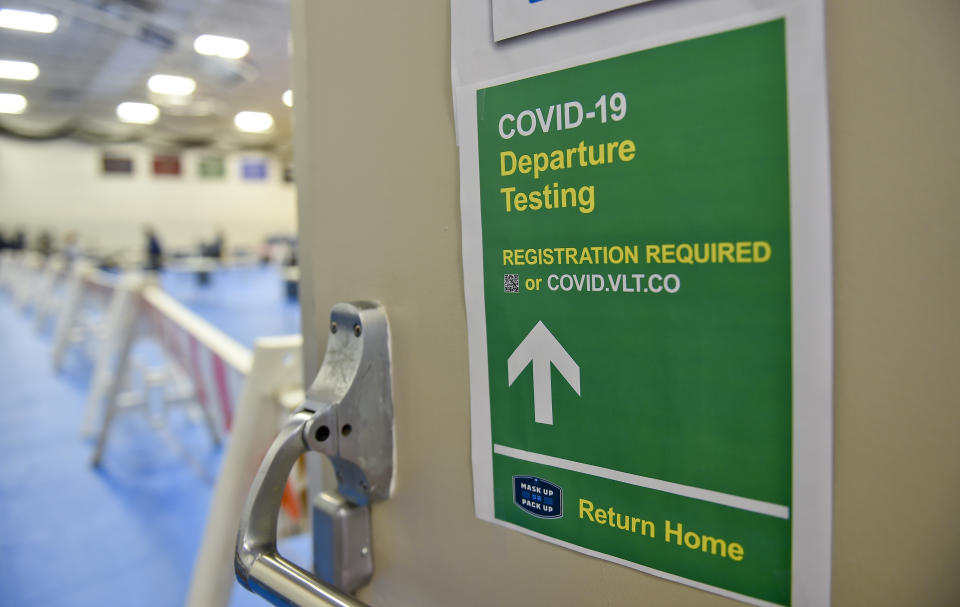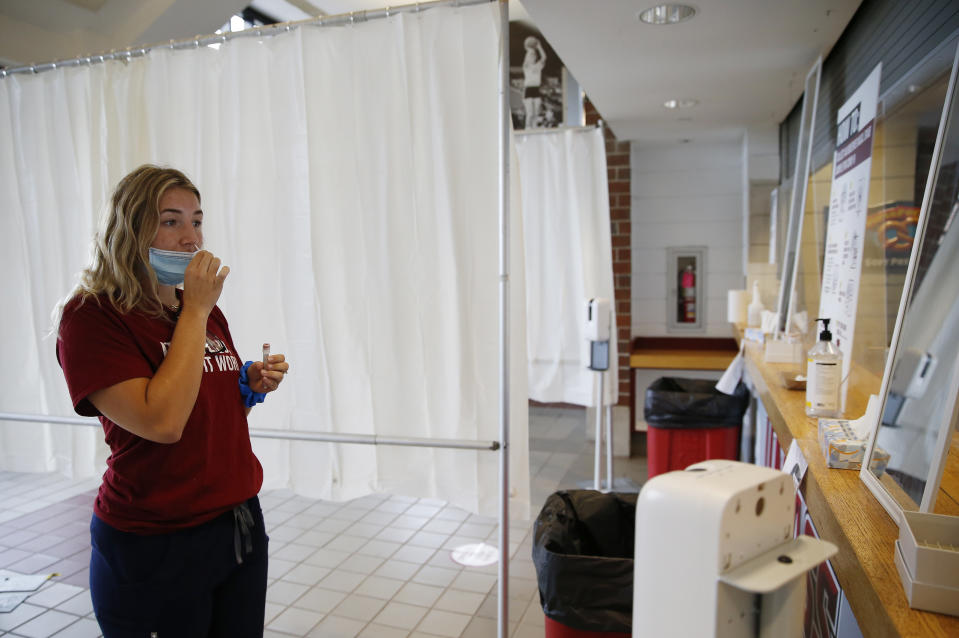Coronavirus fallout of college kids heading home for Thanksgiving 'not going to be subtle,' doctor warns
Confirmed cases of COVID-19, the disease caused by the novel coronavirus, are skyrocketing in the U.S.
And as the country approaches Thanksgiving break, there’s concern among public health experts that the annual travel of college students from college towns to home gatherings will worsen the situation.
“I’m in a bad mood this morning about all this stuff,” Dr. George Rutherford, a professor of epidemiology at UC San Francisco, told Yahoo Finance. “I mean, imagine this scene: Two kids come home from some Midwestern college where there’ve been big spikes ... they come home to California, which is where it has been pretty well controlled. They have a big Thanksgiving dinner with you know, aunts and uncles and grandpa, and grandma gets killed.”
And “that’s what’s going to happen,” Rutherford stressed. “It’s not going to be subtle.”

The Centers for Disease Control and Prevention (CDC) recently recommended against Americans against traveling for Thanksgiving, though daily travel data shows that roughly one million Americans are currently passing through domestic TSA checkpoints.
The situation is particularly worrisome when considering transmission risks coming from colleges, dozens of which saw coronavirus outbreaks while testing and quarantine protocols vary across campuses.
“Any intervention that minimizes this travel back and forth… it's the right thing,” Dr. Peter Chin-Hong, who specializes in infectious diseases at the University of California San Francisco, told Yahoo Finance. “The whole country is on fire, basically, with COVID right now.”
After spring break, according to a new study that analyzed smartphone location data, the return of students to various college towns was followed by “an increase in the growth rate of confirmed cases during the two weeks following the end of spring break.”
“Estimates imply that counties with more early spring break students had a higher growth rate of cases than counties with fewer early spring break students,” authors Daniel Mangrum of the Federal Reserve Bank of New York and Paul Niekamp of Ball State University wrote. “The increase in case growth rates peaked two weeks after spring break.”
‘The most worrisome to someone who studies this stuff’
Chris Marsicano, director of the College Crisis Initiative at Davidson College, found that schools have broadly taken three approaches to preparing students for Thanksgiving travel.
The first approach: Students going back home for the break do not come back and finish the semester remotely. Students staying on campus can finish the semester with in-person learning. The University of Arizona, for example, falls into this bucket.
The second approach involved sending all students home for Thanksgiving and asking them to finish up the semester online. Vanderbilt, which was lauded for its pandemic response, falls into this category. Notre Dame, which initially struggled with reopening campus amid the pandemic, falls into a sidebar within this category, as the school timed the end of the semester with its fall break.
Schools that fall into this main second group, Marsicano noted, “made those plans in August or in June when they were planning their academic calendar.”
The third group “is the category of institutions that chose option one initially, but due to the rapid increase in the number of COVID cases across the country are now saying to their students: ‘We're going online, effective immediately.’”
Marsicano said that this set of colleges is “the most worrisome to someone who studies this stuff.”
The University of Kentucky is one of the schools that falls into this category. The school is urging students to get tested, as opposed to mandating testing. The University of Alabama is another example of a college that isn’t mandating testing.
In the Bluegrass State, @universityofky students are being encouraged to get tested before heading home for the Winter Break, and will be required to retest before returning in the Spring.https://t.co/FDdHFukZNr
9/N— The College Crisis Initiative (C2i) (@C2Initiative) November 11, 2020
Most colleges haven’t been aggressively testing students, according to an October report by NPR, and that lack of diligence could come back to haunt hometowns during Thanksgiving break.
“So what we have is a situation where they can be silent spreaders of the disease,” Marsicano said, “unless institutions decide to actively decide to test all of the students before they let them go home.”
Marsicano, Dr. Rutherford, and many others considered the University of Illinois at Urbana-Champaign to be the gold standard for testing and essentially controlling the spread of COVID-19 on campus. The school has reported a whopping 884,000 tests so far, meaning that the school has conducted more tests than several U.S. states. But most schools are not testing nearly as much, even before Thanksgiving break.
“Very few institutions are… providing that extra testing, and those institutions that are providing that exit testing, it's mostly optional,” he added, referring to students being tested prior to departing campus. “Anecdotally, institutions that are making this pivot at the end of the semester are ones that are not providing or not mandating any symptomatic testing of all students.”

‘Don’t come home for Thanksgiving’
Dr. Rutherford, for his part, told his daughter to stay at school until the semester is over.
“I have a daughter in law school in Virginia... I said: ‘Don’t come home for Thanksgiving,’” Dr. Rutherford said. “When you finish the semester and come home, you’re going to go through two weeks of quarantine. You’re going to get tested during that period.”
And “during that time you test negative, then I’ll put you on a plane and go visit your grandmother… but I’m going to well make sure you’re not infectious before I let you anywhere near her.”
Dr. Chin-Hong, the infectious disease expert, agreed with Rutherford’s mandates.
“The best situation is not to [travel home for break] at all,” he said. “The next best situation is to quarantine for two weeks before interacting with a family plus or minus a test after that, ... [and] maybe doing a test after getting home.”

‘It’s not too late to get your flu shot’
Even some students understand the risks and wonder why schools aren’t doing more.
Sophie, a student at James Madison University (JMU) in Virginia who hasn’t been tested regularly for COVID-19, said she got tested before heading home for Thanksgiving to provide “peace of mind.”
“I’m more nervous of bringing something back to my family on accident just because of the really high rates of cases at JMU due to the really popular party culture here and the lack of control by the university,” Sophie told Yahoo Finance.
Regarding that lack of control, Sophie explained that “JMU only really sent out an email addressing how to stay safe in the sense of driving and keeping your things safe from thieves. There has not been much on quarantining and getting tested. Also, students do not get regularly tested here, so they’re not going to test students coming back unless they make an appointment.”
“Some students aren just left on their own because some schools don't have the sort of resources that are needed to be able to test on a regular basis,” Dr. Rutherford noted, adding a word of wisdom for students who are left to their own devices: “It’s not too late to get your flu shot.”
Read more:
Notre Dame back in spotlight after president caught in Rose Garden coronavirus storm
Colleges prepare for 'hand-to-hand combat' amid declining enrollment and coronavirus pandemic
U.S. colleges saw fewer undergrads enroll this fall, amid COVID-19
Read the latest financial and business news from Yahoo Finance
Follow Yahoo Finance on Twitter, Facebook, Instagram, Flipboard, SmartNews, LinkedIn, YouTube, and reddit.

 money
money 
